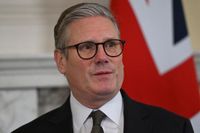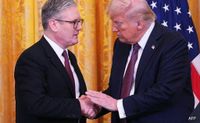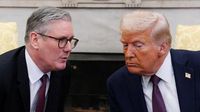The United Kingdom's political landscape is undergoing a seismic shift as Prime Minister Sir Keir Starmer prepares to declare the end of an era defined by globalization. This significant announcement comes in the wake of recent tariffs imposed by U.S. President Donald Trump, which have triggered widespread concern about the future of international trade and economic stability.
In a speech scheduled for Monday, April 7, 2025, Starmer will assert that globalization, a phenomenon that has shaped global economies since the fall of the Soviet Union in 1991, has "failed" many voters. He plans to emphasize that the recent economic turmoil caused by Trump's trade policies necessitates a radical change in the UK’s approach to economic growth and trade.
Starmer's remarks follow a turbulent week marked by Trump's announcement of a 10% baseline import duty on goods from various countries, including the UK. This move has sparked fears of a global recession and prompted retaliatory tariffs from nations such as China and Canada. In his article published in the Sunday Telegraph, Starmer stated, "the world as we knew it has gone," urging the UK to "move further and faster" in cutting red tape to stimulate economic growth.
Chief Secretary to the Treasury Darren Jones echoed Starmer's sentiments during an interview on the BBC's Sunday with Laura Kuenssberg. He declared, "Globalization, as we've known it for the last couple of decades, has come to an end," highlighting the need for the UK to build stronger relationships with allies and invest in its domestic economy. Jones emphasized that the government is not merely reacting to these challenges but is proactively seeking solutions to bolster British businesses.
The Prime Minister has pledged to do everything necessary to protect Britain's national interests, stating the government is "ready to use industrial policy" to shield domestic firms from the impacts of the tariffs. In response to the crisis, Chancellor Rachel Reeves is expected to announce measures aimed at easing regulations on electric vehicle manufacturers and accelerating the Labour government’s industrial strategy.
Despite the dire predictions surrounding globalization, Conservative leader Kemi Badenoch has voiced her disagreement with the notion that globalization is over. In her remarks, she pointed to the UK's "great" trading relationships with other countries and argued that what is occurring is merely "fragmentation" rather than the end of globalization. Badenoch criticized the Labour government for its handling of the situation, suggesting they should revive the trade deal that former Prime Minister Boris Johnson attempted to negotiate with Trump during his presidency.
As the UK grapples with the fallout from Trump's tariffs, the government has opted against imposing retaliatory tariffs, favoring a more diplomatic approach aimed at negotiating a favorable trade deal with the U.S. Jones noted that the UK is hopeful for a successful outcome from ongoing negotiations, asserting that the country has achieved better results than others due to its diplomatic efforts.
Meanwhile, the FTSE 100 experienced its worst trading day since the onset of the pandemic, reflecting the anxiety permeating the markets in response to the tariff announcements. Starmer has been in contact with world leaders, including French President Emmanuel Macron, to discuss the implications of the tariffs on global economics and security.
In a striking contrast, the international response to Trump's tariffs has varied significantly. Countries like India and Taiwan have opted not to impose reciprocal tariffs, seeking instead to engage in diplomatic negotiations to resolve the issues. India's government has expressed a desire to pursue a trade deal with the U.S. without retaliating against the new tariffs, highlighting the strategic importance of maintaining trade relations.
As the situation develops, the global community watches closely to see how the UK will navigate this new era of trade relations. The government's focus on pro-growth policies and industrial strategies aims to mitigate the adverse effects of Trump's tariffs while positioning the UK for future economic success.
Starmer's forthcoming address is expected to mark a pivotal moment in British politics, as he seeks to redefine the country’s economic strategy in light of the changing global landscape. With the stakes higher than ever, the Prime Minister's commitment to protecting British interests and fostering domestic growth will be put to the test in the weeks and months ahead.
As the world grapples with the implications of Trump's tariffs, it remains to be seen whether the UK can adapt to this new reality and emerge stronger in the face of these challenges. The coming days will reveal the government's strategy and its potential impact on both the domestic economy and international relations.








